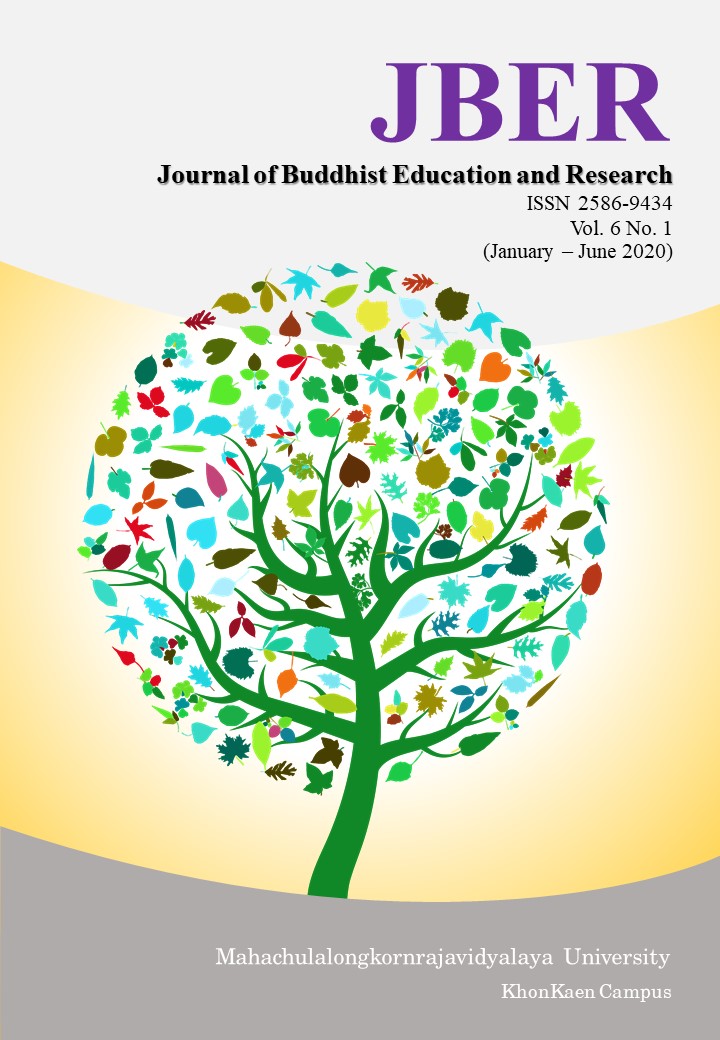การจัดการเรียนรู้วิชาสังคมศึกษา เพื่อส่งเสริมผู้เรียนด้านการป้องกันการทุจริตคอรัปชั่น ตามหลักฆราวาสธรรม 4 นักเรียนชั้นมัธยมศึกษา ปีที่ 1 โรงเรียนพังโคนวิทยาคม จังหวัดสกลนคร
คำสำคัญ:
การป้องกันการทุจริตคอรัปชั่น, หลักฆราวาสธรรม 4บทคัดย่อ
การวิจัยเรื่องนี้ มีวัตถุประสงค์ เพื่อศึกษาสภาพปัญหา สร้างรูปแบบ และเสนอรูป แบบในการจัดการเรียนรู้วิชาสังคมศึกษา เพื่อส่งเสริมผู้เรียนด้านการป้องกันการทุจริตคอรัป ชั่น ตามหลักฆราวาสธรรม 4 นักเรียนชั้นมัธยมศึกษาปีที่ 1 โรงเรียนพังโคนวิทยาคม จังหวัดสกลนคร การวิจัยครั้งนี้เป็นวิธีการวิจัยแบบผสานวิธี (Mixed Methodology Research) ระหว่างวิทยาการวิจัยเชิงเชิงปริมาณ (Quantitative Methodolog Research)กับวิธีวิทยา การวิจัยเชิงคุณภาพ (Qualitative Methodolog Research) กับกลุ่มตัวอย่างที่ใช้ในการวิจัย จำนวน 140 คน โดยใช้แบบสอบถามและแบบสัมภาษณ์ในการเก็บรวบรวมข้อมูลวิจัย สถิติที่ใช้ในการวิจัยได้แก่ สถิติเชิงพรรณนา (Descriptive Statistics) สถิติเชิงอนุมาน (Inferential Statistics)
ผลการวิจัยพบว่า
การจัดการเรียนรู้วิชาสังคมศึกษา เพื่อส่งเสริมผู้เรียนด้านการป้องกันการทุจริตคอรัปชั่น ตามหลักฆราวาสธรรม 4 นักเรียนชั้นมัธยมศึกษาปีที่ 1 โรงเรียนพังโคนวิทยาคม จังหวัดสกลนคร โดยภาพรวมอยู่ในระดับมาก ไดแก่ การจัดการเรียนรู้การป้องกันการทุจริตคอรัปชั่นตามหลัก จาคะ คือ การจัดการเรียนรู้การป้องกันการทุจริตคอรัปชั่นตามหลัก สัจจะ คือ ความจริง การจัดการเรียนรู้การป้องกันการทุจริตคอรัปชั่นตามหลัก ทมะ คือ การข่มใจ และด้านการจัดการเรียนรู้การป้องกันการทุจริตคอรัปชั่นตามหลัก ขันติ คือ ความอดทน
รูปแบการจัดการเรียนรู้วิชาสังคมศึกษา เพื่อส่งเสริมผู้เรียนด้านการป้องกันการทุจริตคอรัปชั่น ตามหลักฆราวาสธรรม 4 นักเรียนชั้นมัธยมศึกษาปีที่ 1 โรงเรียนพังโคนวิทยาคม จังหวัดสกลนคร ด้านสัจจะ ใช้วิธีการสอนแบบสถานการณ์จริง ด้านทมะ ใช้วิธีการสอนแบบกรณีศึกษา ด้านขันติ ใช้วิธีการสอนแบบบทบาทสมมติ และด้านจาคะ ใช้วิธีการสอนแบบแก้ปัญหา
แนวทางการจัดการเรียนรู้วิชาสังคมศึกษา เพื่อส่งเสริมผู้เรียนด้านการป้องกันการทุจริตคอรัปชั่น ตามหลักฆราวาสธรรม 4 ด้านสัจจะ คุณครูควรใช้วิธีการสอน โดยใช้สื่อ ข่าวสาร หรือสถานการณ์จริง ผ่านกระบวนการกลุ่มในการระดมความคิดและวิเคราะห์เกี้ยวกับสัจจะ ด้านทมะ ครูใช้วิธีการจัดการเรียนรู้ที่ ใช้วิธีการสอนแบบ กรณีศึกษาให้นักเรียนศึกษา ด้านขันติ ครูใช้วิธี การจัดการเรียนรู้ ใช้วิธีการสอนแบบ แสดงบทบาทสมมุติแล้วให้นักเรียน ร่วมกันวิเคราะห์ จากการแสดงบทบาทสมมุติ ด้านจาคะ ครูใช้วิธี การจัดการเรียนรู้เพื่อส่งเสริมผู้เรียนด้านการป้องกันการทุจริตคอร์รัปชั่น จะใช้หลากหลายวิธีแล้วแต่ ความเหมาะสมกับเนื้อหาและพื้นฐานของนักเรียนเช่นวิธีการสอนแบบแก้ปัญหา วิธีการสอนแบบอริยสัจ 4 หรือกระบวนการเรียนรู้ แบบจิ๊กซอว์
เอกสารอ้างอิง
นภธร ศิวารัตน์ และ รศ.ดร.ภักดี โพธิ์สิงห์. (2561). ทิศทางการคอร์รัปชั่นในประเทศไทย. วารสารสถาบันวิจัยและพัฒนา มหาวิทยาลัยราชภัฏมหาสารคาม. 5(2),343-354.
ปิยะธิดา อภัยภักดี. (2561). แนวทางการป้องกันและปราบปรามการทุจริตคอรัปชั่นในหน่วยงานภาครัฐ. วารสารบัณฑิตวิทยาลัย มหาวิทยาลัยราชภัฏจันทรเกษม. 13(1), 1-12.
พระสมชาย เตชปญฺโญ (เตชะ) และคณะ. (2561). การบริหารงานวิชาการตามหลักฆราวาสธรรม 4 ของผู้บริหารโรงเรียนมัธยมศึกษา อำเภอวังน้อย จังหวัดพระนครศรีอยุธยา. วารสารบัณฑิตศึกษาปริทรรศน์ วิทยาลัยสงฆ์นครสวรรค์, 6(2) ฉบับพิเศษ, 241-256.
พระสมทบ ถิรปญฺโญ (รุ่งมิตรจรัสแสง). (2554). ภาวะผู้นำของเยาวชนตามหลักฆราวาสธรรม 4 : กรณีศึกษาโรงเรียนหล่มสักวิทยาคม จังหวัดเพชรบูรณ์. พุทธศาสตรมหาบัณฑิต สาขาวิชารัฐประศาสนศาสตร์. มหาวิทยาลัยมหาจุฬาลงกรณราชวิทยาลัย.
วิจารณ์ พานิช. (2556). การสร้างการเรียนรู้สู่ศตวรรษที่ 21. กรุงเทพฯ: ส.เจริญการพิมพ์.
วิภาพรรณ พินลา. (2560). แนวทางการจัดการเรียนรู้วิชาสังคมศึกษา เพื่อพัฒนาทักษะการคิดอย่างมีวิจารณญาณสำหรับผู้เรียนในศตวรรษที่ 21. วารสารปาริชาต. 30(1), 13-34.
สำนักงานคณะกรรมการการอาชีวศึกษา. (2561). แนวทางการจัดกิจกรรมส่งเสริมการป้องกันการทุจริตด้านอาชีวศึกษา. สมุทรปราการ: เอส.บี.เค.การพิมพ์.
สำนักงานคณะกรรมการป้องกันและปราบปรามการทุจริตแห่งชาติ. (2561). หลักสูตรต้านทุจริตศึกษา. กรุงเทพฯ: สำนักงานคณะกรรมการป้องกันและปราบปรามการทุจริตแห่งชาติ.





